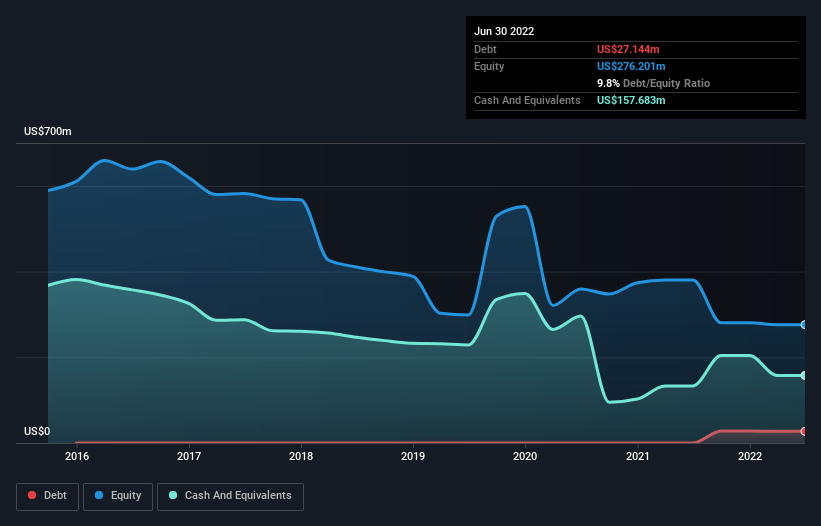Howard Marks put it nicely when he said that, rather than worrying about share price volatility, 'The possibility of permanent loss is the risk I worry about... and every practical investor I know worries about.' It's only natural to consider a company's balance sheet when you examine how risky it is, since debt is often involved when a business collapses. We note that Karoon Energy Ltd (ASX:KAR) does have debt on its balance sheet. But is this debt a concern to shareholders?
Why Does Debt Bring Risk?
Debt and other liabilities become risky for a business when it cannot easily fulfill those obligations, either with free cash flow or by raising capital at an attractive price. Part and parcel of capitalism is the process of 'creative destruction' where failed businesses are mercilessly liquidated by their bankers. However, a more usual (but still expensive) situation is where a company must dilute shareholders at a cheap share price simply to get debt under control. Of course, plenty of companies use debt to fund growth, without any negative consequences. When we think about a company's use of debt, we first look at cash and debt together.
Check out our latest analysis for Karoon Energy
What Is Karoon Energy's Net Debt?
The image below, which you can click on for greater detail, shows that at June 2022 Karoon Energy had debt of US$27.1m, up from none in one year. But it also has US$157.7m in cash to offset that, meaning it has US$130.5m net cash.

How Healthy Is Karoon Energy's Balance Sheet?
We can see from the most recent balance sheet that Karoon Energy had liabilities of US$247.4m falling due within a year, and liabilities of US$640.5m due beyond that. On the other hand, it had cash of US$157.7m and US$56.3m worth of receivables due within a year. So its liabilities outweigh the sum of its cash and (near-term) receivables by US$673.9m.
When you consider that this deficiency exceeds the company's US$640.3m market capitalization, you might well be inclined to review the balance sheet intently. In the scenario where the company had to clean up its balance sheet quickly, it seems likely shareholders would suffer extensive dilution. Given that Karoon Energy has more cash than debt, we're pretty confident it can handle its debt, despite the fact that it has a lot of liabilities in total.
Better yet, Karoon Energy grew its EBIT by 711% last year, which is an impressive improvement. If maintained that growth will make the debt even more manageable in the years ahead. The balance sheet is clearly the area to focus on when you are analysing debt. But it is future earnings, more than anything, that will determine Karoon Energy's ability to maintain a healthy balance sheet going forward. So if you're focused on the future you can check out this free report showing analyst profit forecasts.
Finally, a company can only pay off debt with cold hard cash, not accounting profits. While Karoon Energy has net cash on its balance sheet, it's still worth taking a look at its ability to convert earnings before interest and tax (EBIT) to free cash flow, to help us understand how quickly it is building (or eroding) that cash balance. Over the last two years, Karoon Energy saw substantial negative free cash flow, in total. While that may be a result of expenditure for growth, it does make the debt far more risky.
Summing Up
While Karoon Energy does have more liabilities than liquid assets, it also has net cash of US$130.5m. And it impressed us with its EBIT growth of 711% over the last year. So while Karoon Energy does not have a great balance sheet, it's certainly not too bad. Given our hesitation about the stock, it would be good to know if Karoon Energy insiders have sold any shares recently. You click here to find out if insiders have sold recently.
If, after all that, you're more interested in a fast growing company with a rock-solid balance sheet, then check out our list of net cash growth stocks without delay.
Valuation is complex, but we're here to simplify it.
Discover if Karoon Energy might be undervalued or overvalued with our detailed analysis, featuring fair value estimates, potential risks, dividends, insider trades, and its financial condition.
Access Free AnalysisHave feedback on this article? Concerned about the content? Get in touch with us directly. Alternatively, email editorial-team (at) simplywallst.com.
This article by Simply Wall St is general in nature. We provide commentary based on historical data and analyst forecasts only using an unbiased methodology and our articles are not intended to be financial advice. It does not constitute a recommendation to buy or sell any stock, and does not take account of your objectives, or your financial situation. We aim to bring you long-term focused analysis driven by fundamental data. Note that our analysis may not factor in the latest price-sensitive company announcements or qualitative material. Simply Wall St has no position in any stocks mentioned.
About ASX:KAR
Karoon Energy
Operates as an oil and gas exploration and production company in Brazil, the United States, and Australia.
Very undervalued with adequate balance sheet.
Similar Companies
Market Insights
Community Narratives





